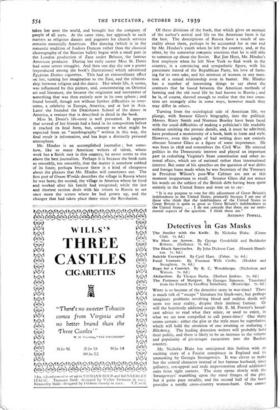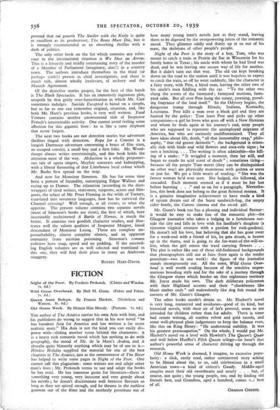Detectives in Gas Masks
Suicide Excepted. By Cyril Hare. (Faber. 7s. 6d.) WHAT is to become of the detective story in war-time? There is much talk of " escape " literature for black-outs, but perhaps imaginary problems involving blood and sudden death will
seem too near reality, despite their intrinsic fantasy. Or will the hopelessly addicted accept Mr. E. M. Forster's broad- cast advice to read what they enjoy, or used to enjoy, in what we are now compelled to call peace-time? One thing
seems certain : either the plot or the style must be superlative,
which will hold the attention of one awaiting or enduring a Blitzkrieg. The leading detection writers will probably hold their public, and there is likely to be an increase in the volume and popularity of picaresque excursions into the Buchan
country.
Mr. Nicholas Blake has anticipated this fashion with an
exciting story of a Fascist conspiracy in England and its unmasking by Georgia Strangeways. It was clever to make
her the central character instead of her famous husband, since gallantry, sex-appeal and male impersonation afford additional
exits from tight comers. The story opens slowly with the Strangeways' stumbling upon the outer fringes of the plot,
but it gains pace steadily, and the second half of the book provides a terrific cross-country woman-hunt. One cannot pretend that sui generis The Smiler with the Knife is quite as excellent as its predecessor, The Beast Must Die, but it is strongly recommended as an absorbing thriller with a dash of politics.
The only other book on the list which contains any refer- ence to the international situation is We Shot an Arrow. This is a leisurely and mildly entertaining story of the murder of a Member of Parliament (imaginary, alas!) in a country town. The authors introduce themselves in the third (or perhaps sixth?) person as chief investigators, and there is much talk, almost wholly irrelevant, of archery and the Munich Agreement.
Of the detective stories proper, far the best of this batch is The Black Spectacles. It has an immensely ingenious plot, unspoilt by that grisly over-fantastication in which Mr. Carr sometimes indulges. Suicide Excepted is based on a simple, but as far as one can remember original, situation, and, like both Mr. Hare's previous books, is very well written. Fatal Venture contains another unsweetened slab of Inspector French's interminable activity. One cannot avoid feeling some affection for this gigantic bore: he is like a tame elephant that never forgets.
The next two books are not detective stories but adventure thrillers tinged with detection. Rope for a Convict is a longish Dartmoor adventure concerning a brace of film stars, an escaped convict, a small boy and a first folio. Mr. Wood- thorpe always writes entertainingly, and this book holds the attention most of the way. Abduction is a wholly preposter- ous tale of opera singers, Mayfair sorcerers and kidnapping, with a liberal flavouring of that Limehouse local colour which Mr. Burke first spread on the map.
And now for Monsieur Simenon. He has for some time been a portent of fecundity, outstripping Edgar Wallace and racing up to Dumas. The relaxation (according to the dust- wrapper) of tired writers, statesmen, surgeons, actors and film- goers, the solace of Mr. Peter Fleming in the wilds of Tartary, translated into seventeen languages, how has he survived the Channel crossing? Well enough, at all events, to whet the appetite. The present volume contains two separate novels (most of Simenon's books are short), the first of which, here inscrutably rechristened A Battle of Nerves, is much the better. It contains two goodish character studies, and illus- trates well the salient qualities of Inspector Maigret, lineal descendant of Monsieur Lecoq. These are complete im- perturbability, almost complete silence, and an apparent immunity from nicotine poisoning. Sirnenon's romans policiers have snap, speed and no padding. If the succeed- ing English volumes are as well selected and translated as this one, they will find their place in many an Anderson snuggery.
RUPERT HART-DAVIS.













































 Previous page
Previous page